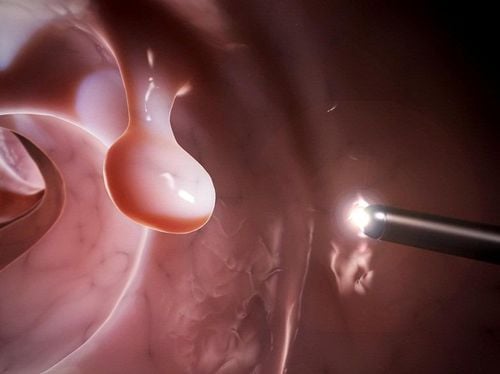This is an automatically translated article.
The article was professionally consulted by MSc Vu Van Quan - Gastroenterologist, Department of General Surgery & Anesthesiology - Vinmec Hai Phong International General HospitalPolyp is the term used to refer to growths of the lining of the mucous membrane. This growth can appear in the digestive tract, uterus, bladder, nasal passages, or genital area. Some colon polyps can turn cancerous. Determining what type of colorectal polyps is important in the prevention and treatment of the disease.
1. What are colon polyps?
Colon polyp is the medical term to refer to neoplastic tissue created by excessive tissue proliferation as well as tumor growth and persists in the colonic lumen. In fact, the majority of these tumors are benign, but there will also be cases of malignancy or malignancy if not detected and treated promptly and properly.
Colonic polyps actually have many different types, of which two main types are sessile and pedunculated colon polyps. Doctors will rely on polyp morphology to distinguish colonic polyps with peduncles and without peduncles.
Besides, people also conduct classification based on the number or size of polyps. According to specialists, some people have many colon polyps or one polyp, some people have small polyps, but besides that, there are also patients who let the polyps grow much larger for a long time.
2. Colonic polyps without stalks
The distinction between pedunculated and pedunculated colon polyps is completely based on endoscopic methods and only specialists can provide accurate information to clearly classify them.
Colonic polyps without stalks have the following characteristics:
Colon polyps are smaller than 5mm in size, they do not have a peduncle. Compared with the surrounding colonic mucosa, these sessile colon polyps are much lighter in color and can be seen very clearly. The base of pedunculated colon polyps is wider than that of pedunculated polyps. The chance of developing from benign to malignant is higher. That means if your colon polyp is diagnosed as sessile type, you need to be very careful to monitor it and not be subjective.
3. Colonic polyps with stalks
Unlike pedunculated colon polyps, pedunculated colon polyps will have a long pedunculated appearance under the colonoscope. The base of the colon polyp has a stalk that is not wide, but long and small. Even the stalk can be very long, winding.
The ability of polyps to grow from benign to malignant is lower than that of sessile polyps. However, this is not absolute, so we still need to carefully monitor their condition.
Whether pedunculated or sessile polyps, colon polyps are mostly benign. With benign conditions, the tumor will persist for many years without affecting health, but patients need to regularly visit the hospital to check and monitor whether the tumor grows or grows many polyps. other colon or not.
4. Types of rectal polyps

Rectal polyps are represented by tumor-like growths on the mucosal surface of the rectum or gastrointestinal tract. The disease often manifests silently and is easily confused by gastrointestinal diseases such as abdominal pain, loose stools, blood in stools, etc. Rectal polyps have different sizes and numbers. quantity. Currently, colon polyps are divided into 3 basic types:
Hyperplastic polyps are harmless and are not likely to develop into cancer. Adenomatous polyps are a fairly common type of tumor. Although they are unlikely to develop into rectal cancer, adenomatous polyps have a risk of developing into colon cancer. Malignant polyps are noted with cancerous cells under the microscope. Although rectal polyps are not dangerous diseases, you should not be subjective. When detecting abnormal signs in the digestive tract, quickly see a doctor for more specific advice. If you're still worried about rectal polyps thriving in the future, don't be complacent about the once-a-year repeat screening methods.
Please dial HOTLINE for more information or register for an appointment HERE. Download MyVinmec app to make appointments faster and to manage your bookings easily.













